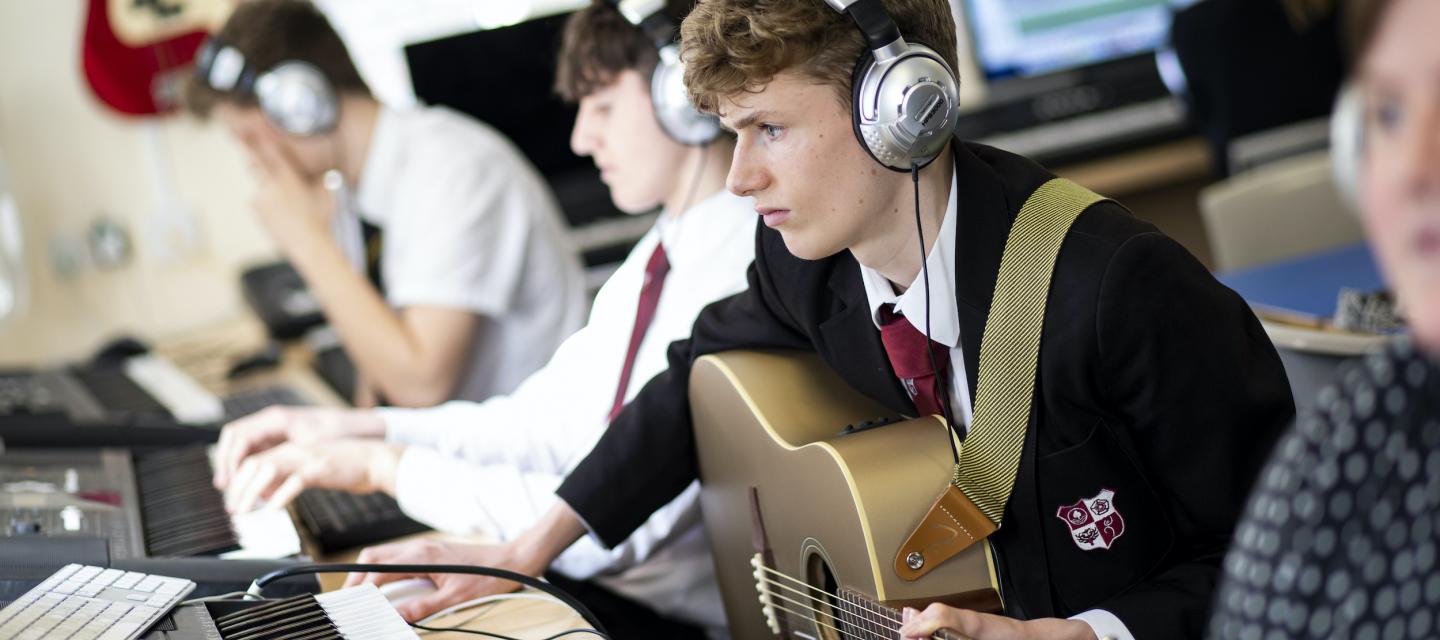In Noadswood Music department, we believe that the Arts in education are fundamental; music is a language that everyone can speak, and is included for everyone in everyday life. In the Music department we express ourselves through composition and performance, and help pupils to be independent, creative and confident in their work. Every pupil will study music at Key Stage 3, giving them an understanding of different cultures and genres of music from across the globe, and we are proud to get them all involved in music, with no exceptions.
We are lucky enough as a Music department to be well stocked with high quality Musical Technology and equipment meaning that we can study a huge range of musical subjects. We aim to and have practical lessons as much as possible, engaging pupils with current and up to date topics. We strive to give pupils the opportunity for creative growth and give them a sense of pride in their finished products - there are regular performance opportunities at Noadswood, termly concerts and a yearly show.
We try to have as much fun as possible, be practical, and make sure that everyone can get involved. There is a vast amount of after school clubs and support sessions to catch up with Music work, as well as in class support. Clubs such as our choir, our Music Tech club and our pupil bands can be heard throughout the school on a daily basis. We have been regular performers at local carol concerts for the Alzheimer’s Society, and enjoy spreading a positive message through music in the community.
In Year 7 we study:
Blues Music – composing our own Blues music
Ringtones – composing our own ringtones using Music Technology
Program Music – composing our own music around a given brief using Music Technology
Protest Songs – creating and performing our own protest song
In Year 8 we study:
Reggae – composing and performing our own Reggae songs.
Music in the Media – adding our own music to popular adverts using Music Technology
African Drumming – performing as part of an African Drumming ensemble
Dance Music – creating our own EDM song using Music Technology.
Year 9 is used as a foundation to either GCSE or BTec Music, with topics covered such as:
Battle of the Bands – creating our own cover of a song
Film Music – composing the music for film trailers
Record Label Challenge – creating our own record label and composing a song using Music Technology
Keyboard Skills – developing our ability to play the keyboard and understand sheet music
We have two courses running for KS4 music – GCSE Music or BTec Music.
GCSE Music
You study 8 different pieces of music & learn about the various musical features of each piece. You study classical music, pop music, musicals, experimental music and music from different countries and cultures. You will also learn about notation and writing down music by hand. You also compose your own pieces of music and perform either by playing your instrument or singing.
You need to either play an instrument or sing for GCSE Music as you must do performances. It can be any instrument – guitar, piano, drums, keyboard etc—all instruments (and singing) count
How is it assessed?
40% Written Exam – 1hr 45 mins – based on the eight set works
30% Compositions (which you will write yourself and record using Logic)
30% Performance (1 solo and 1 ensemble performance)
BTec Music
You focus on various aspects of Music Technology and the industry, including how to set up and use Logic, studio recording and editing, how to produce your own music and learning about different genres of music. For this course you do not need to play an instrument, but it could help if you did! It is all based on the various uses of technology. If you do play an instrument you can use that instrument in your work, but you don’t have to have previously learnt one.
How is it assessed?
Three practical units across the two years, each demonstrating different Music Technology and practical skills.
